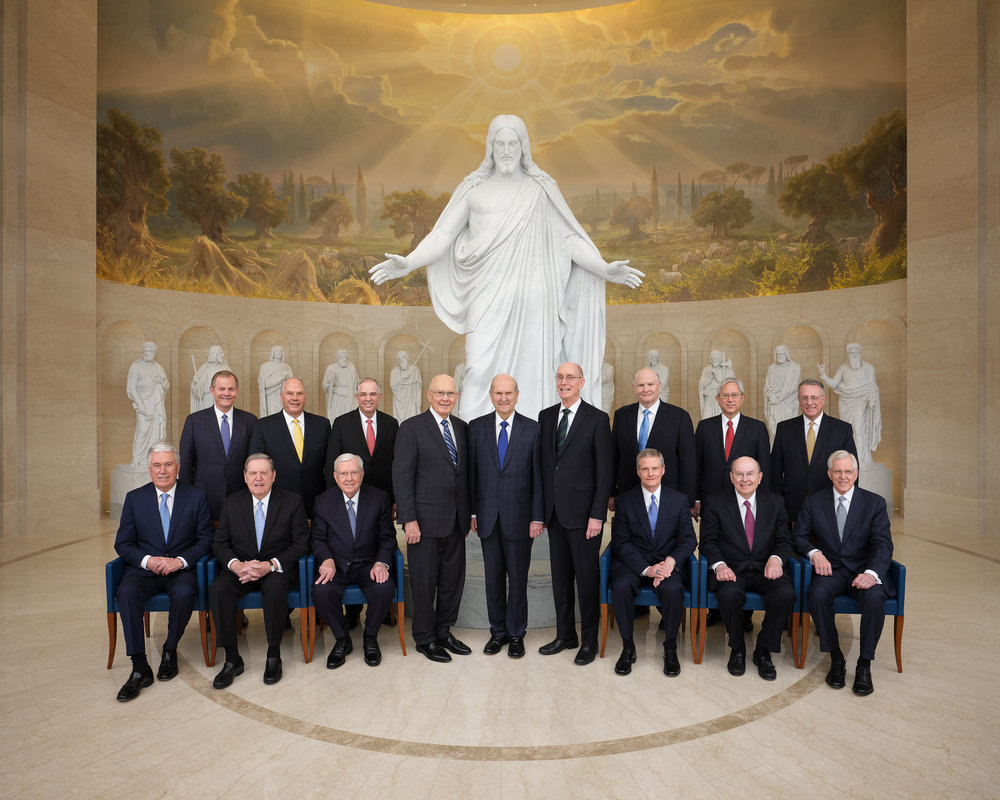To accompany your Come Follow Me study for October 2-8
In addition to reading the indicated chapters, you may wish to:
Read the applicable portion of the New Testament Institute Student Manual at :
See the following videos:
- Book of Ephesians Summary: A Complete Animated Overview at Book of Ephesians Summary: A Complete Animated Overview – YouTube
- Ephesians 6 | The Armor of God | The Bible at Ephesians 6 | The Armor of God | The Bible – YouTube
If you would like a Kahoot game related to this material which you could use for personal study or use with your family or your class, click here: https://create.kahoot.it/share/ephesians/ad365bd1-bdaf-4169-8870-9cb4f6e9d2ab. (To use it with a group, after clicking on this link, you will need to log into Kahoot, creating a free account if you have not done so previously, then click on the blue “Start” button.)
Points to Ponder in Ephesians
1. What implications can you draw from Ephesians 1:10 for the future destiny of The Church of Jesus Christ of Latter-day Saints? What relationship does the passage have to D&C 78:14?
2. What use could you make of the each of the following passages in missionary work? Can you give a mini lesson built around each? What limitations, if any, do some of these passages have?
- Ephesians 1:4
- Ephesians 1:17
- Ephesians 2:8-10
- Ephesians 2:19-21
- Ephesians 3:15
- Ephesians 4:4-6
- Ephesians 4:11-14
3. What does Paul mean by “the prince of the power of the air” in 2:2?
4. Ephesians 5:21‑25 and 6:1‑4 give instructions for proper family relationships. Which aspects of this counsel do you feel need more emphasis?
5. Does Ephesians 6:5 suggest that the Lord condones slavery? What applications of Paul’s counsel can you see for us today?
6. What shareable thoughts or feelings do you have, that you would be willing to share, as you read each of the following passages?
- Ephesians 1:13-14
- Ephesians 3:16-21
- Ephesians 4:2
- Ephesians 4:19
- Ephesians 4:26 (And how could this verse be reworded to be clearer?)
- Ephesians 4:28-32
- Ephesians 5:3-5
- Ephesians 5:19
- Ephesians 6:8
- Ephesians 6:12-17
Possible Answers to Points to Ponder in Ephesians
1. What implications can you draw from Ephesians 1:10 for the future destiny of The Church of Jesus Christ of Latter-day Saints? What relationship does the passage have to D&C 78:14?
It seems to imply that eventually all truths and all that is good will be centered in Zion and will be part of the kingdom of God. The Church, as it becomes independent of all other organizations and creatures on earth, will need to have members who are superior in every field of worthy human endeavor. Joseph Smith taught, “The dispensation of the fullness of times will bring to light the things that have been revealed in all former dispensations; also other things that have not been before revealed. He shall send Elijah, the Prophet, etc., and restore all things in Christ.”
2. What use could you make of the each of the following passages in missionary work? Can you give a mini lesson built around each? What limitations, if any, do some of these passages have?
- Ephesians 1:4. Pre-mortal ordination presupposes, but does not conclusively prove, a premortal life. There are better scriptural passages to confirm the reality of our life before birth.
- Ephesians 1:17. Paul attests to the need for on-going personal revelation. Each prospective convert should learn by revelation from God that the message of the missionaries is true.
- Ephesians 2:8-10. If we read v. 10, it is clear that works, while not “earning” us salvation, are indeed important in the eyes of God. We freely and gratefully acknowledge that we are saved by grace, but that our faith should manifest itself in a willingness to do the things the Lord has commanded.
- Ephesians 2:19-21. We should be built on a foundation of apostles and prophets. This passage by itself would not prove that Paul was speaking of living prophets and apostles. It could be argued that we were to build on the foundation laid by those who had gone before. To establish the need for living prophets and apostles, Ephesians 4:11-14 is much more useful.
- Ephesians 3:15. All those in heaven and earth are part of the same divine family, headed by the Father of our Lord Jesus Christ.
- Ephesians 4:4-6. There is only one true church.
- Ephesians 4:11-14. Living apostles and prophets and a formal church organization are still needed, as we haven’t yet become perfect.
3. What does Paul mean by “the prince of the power of the air” in 2:2?
A search in Bing’s artificial intelligence app summarizes it as follows:
“The Apostle Paul used this phrase to describe the devil’s influence over the world and its systems. In the ancient world, the air was seen as the realm of the invisible, supernatural powers, and so by calling Satan “the prince of the power of the air,” Paul was emphasizing his role as the ruler of the spiritual forces of evil that operate in the unseen realm.
“This phrase also implies that Satan has some measure of authority or power in this world, which he uses to exert his influence over people’s thoughts, attitudes, and behaviors. This influence can be seen in the ways that people are tempted to sin and rebel against God’s commands.
“Overall, the phrase “the prince of the power of the air” highlights the spiritual battle that believers face and emphasizes the need to rely on God’s strength to resist the devil’s schemes and stand firm in the faith.
4. Ephesians 5:21‑25 and 6:1‑4 give instructions for proper family relationships. Which aspects of this counsel do you feel most need additional emphasis?
Your choice. I think we could stress more the idea of Ephesians 5:21, that each partner should be willing to submit to the other and place his or her wishes ahead of their own. It would be hard to have arguments that way. Clearly, husbands are to love wives “as their own bodies,” and care for their needs, as Christ does for those of the church. Though there is much in the scriptures about wives being subject to their husbands, there is nothing that suggests husbands should demand or enforce such subjection. Chapter 6 emphasizes not only that children are to obey their parents, but that parents (especially fathers) are not to provoke their children.
5. Does Ephesia5.ns 6:5 suggest that the Lord condones slavery? What applications of Paul’s counsel can you see for us today?
The Lord doesn’t condone slavery, but elimination of temporal slavery has never been as high a priority for Him as eliminating spiritual slavery. Where the laws of man have permitted slavery, the Lord’s instructions have typically been to not rock the boat–that slaves should be obedient and submissive, showing forth the gospel through their good examples. If the gospel message had been seen as an anti-slavery message, it would have been harder than it was to have the freedom to preach in the Roman world (or in pre-Civil War America). This passage may have some application to our relationships with employers, temporal and spiritual authorities, family authority, etc. For example, we could be better at cheerfully accepting counsel (and even orders) and less hasty to agitate and contend. And 6:9 goes on to give corresponding counsel to the slave masters, that they should “forbear threatening,” as should wise employers and parents.
6. What shareable thoughts or feelings do you have, that you would be willing to share, as you read each of the following passages?
Your choice. Here are a few of my own thoughts:
- Ephesians 1:13-14. Having received the Holy Spirit is like getting “earnest money” or a down payment, assuring us that the rest of the promised blessings for living the gospel will really come.
- Ephesians 3:16-21. What God has in store for us is greater than we can even imagine.
- Ephesians 4:2. “Forbearing [forgiving, tolerating] one another in love” is a great description of how families, organizations, and nations can live in peace.
- Ephesians 4:19. It is possible to get to the point that we no longer have an effective conscience.
- Ephesians 4:26. In virtually all translations of this passage, Paul seems to be saying it’s fine to go ahead and be angry, provided you don’t sin as a result. But somehow that didn’t sound right to Joseph Smith. Under inspiration, he changed the passage to read, “Can ye be angry and not sin?.”
- Ephesians 4:28-32. Some great practical counsel for righteous living!
- Ephesians 5:3-5. Some kinds of “jesting” are appropriate, and some are not. The Greek word which is here translated as “jesting” is “eutrapelia.” It had the connotation of vulgar, coarse, indecent, or crude joking. Paul is clearly telling us to avoid such. He is not talking at all about the kind of innocent humor that we frequently hear Church authorities use even in general conference.
- Ephesians 5:19. Music was clearly an important part of Christian worship in Paul’s day, as it should be in ours.
- Ephesians 6:8. How we live is much more important than under what conditions we live.
- Ephesians 6:12-17. We are at war with evil! We ought to take it seriously and arm ourselves and protect ourselves in such ways as Paul suggests.

